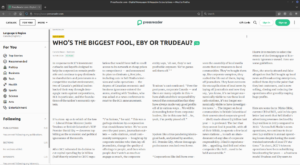With respect to my comment on Eby on Tuesday, I noted a piece in the “National Post” (apparently in the “Financial Post” section) by some nameless entity (see screenshot above) — perhaps the Post itself, or perhaps an individual named “Corcoran” (see second screenshot) — but not marked as “opinion” (see first screenshot) even though it clearly is, titled “Who’s the biggest fool, Eby or Trudeau?” It’s hilarious that anyone who disagrees with the almighty Bell is considered a “fool” or an “ignoramus”. That’s what’s called an ad hominem attack; if you can’t explain why you disagree with someone, call them a name. The words “fool” and “ignoramus” work. And if you run short of names to call people, just pull up a recent campaign speech (or any speech) by a guy named donald trump to get some more words … although not that many, since the guy has a very limited vocabulary.
But hey, I get it, people disagree! So I’ll raise the bar a little and respond intelligently instead of calling the “National Post” (or Corcoran) “fools”.
I don’t believe anybody — Eby, Trudeau or anyone else — is suggesting that BCE should subsidise their subsidiaries until the end of time. But big business(es), and those on the right in general, are big on the fact that people should take responsibility for their own actions. What a concept! But that only applies to poor people on skid row and drug addicts, not big business. It’s completely unreasonable, foolish even, for us idiots that don’t run BCE and other massive companies to think that BCE should take responsibility for their own misguided, stupid and even foolish decision to attempt to buy up the media industry, and their own foolish decision to run said media industry into the ground with their ignorance! It’s foolish for us to believe that BCE should pay back various levels of government the money that they/us — Canadian taxpayers! — will pay in (un)employment insurance to the unemployed journalists, cameramen, teleprompter readers and various other human beings that will become unemployed.
Of course not! It’s their own fault they’re unemployed! The fools! And if it’s not their fault it’s the big bad government’s fault for forcing us to work within the confines of decent, modern, civilised Canadian society!
“Bullshit”, as described by the “Financial Post”, is quite clearly the domain of big business press releases (viz. “moving forward”, at least for the employees that won’t be moving backwards in lifestyle) … and the fools at the “Financial/National Post”. I hereby award the “Harry G. Frankfurt Award for Demagogic Bullshit” jointly to Corcoran, their shitty newspaper and BCE Inc.!
Updated, 17 February 2024: Made notes about the possible author of the article in the captions of the screenshots.





